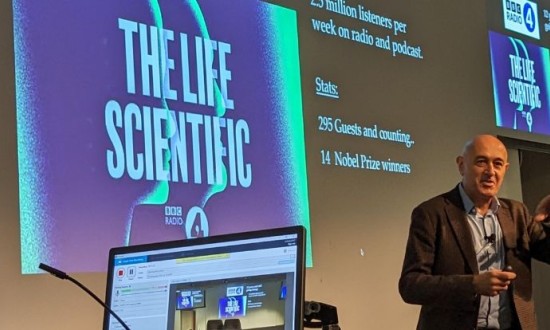UKRI needs to change to facilitate interdisciplinary working, says Jim Al-Khalili
When it comes to interdisciplinary working, industry is in the lead, universities “get it” and are moving in the right direction, but the UK’s funding bodies are lagging behind, which holds back the whole research infrastructure.
“The challenges we face today – like climate change, biodiversity, AI, genetic engineering and medical advances, as well as all the United Nations Sustainable Development Goals – can’t be tackled by people from single disciplines,” said Jim. “They’re too big.”
Instead, we must look at the problems that need solving and identify what skills we need to achieve that, assembling teams accordingly. “People with different areas of expertise must come together, talk to each other and learn a common language,” he said. “By working with people in different areas, we are forced to take fresh approaches.”
But he acknowledged that the UK’s research infrastructure doesn’t help academics take that approach. “Our funding models are really not fit for purpose in a world where interdisciplinary research is important.”
He also highlighted problems with the Research Evaluation Framework, or REF. “There is an acknowledgement within the REF process that there are certain areas of research, certain outputs, that don’t fall into one category, but there’s still a long way to go. We still have this silo mentality.”

Jim, who has interviewed 14 Nobel prize winners, one Fields Medal winner (the maths equivalent of a Nobel prize), five presidents of the Royal Society and three Government Chief Scientific Advisors on his BBC Radio 4 programme, 'The Life Scientific', said many of his guests work in interdisciplinary areas. “They’ve made their breakthroughs or they’ve changed the world in some way because they’ve taken expertise from one discipline that they’ve trained in and they’ve applied it somewhere else.”
By using examples from his own research, he showed how he has worked across disciplines, for example working with Johnjoe McFadden, a molecular geneticist, to establish the Leverhulme Doctoral Training Centre for Quantum Biology and partnering with computer scientists, mathematicians, chemists, biologists, physicists and philosophers on his Life on the Edge project looking at Quantum Thermodynamics, Quantum Biology and the Arrow of Time, funded by the John Templeton Foundation.
Longer term, Jim pointed towards changes beyond UKRI and REF. “20 or 30 years from now we probably won’t be teaching Physics, Chemistry and Biology in school; we’ll be teaching AI, genetics, robotics and sustainability or climate science, areas that are already interdisciplinary by today’s standards. In the future, I think those boundaries will merge and new disciplines will come about.”
As a first step, let’s see what happens in the next REF and whether interdisciplinary research starts to be dealt with in a fairer way.
